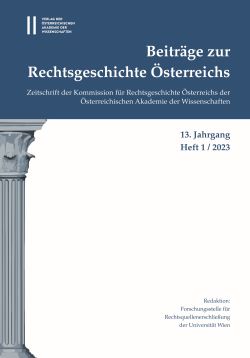|
 |
Der aktuelle Band enthält vermischte Themen zur Privatrechts-, Strafrechts- und Verfassungsgeschichte von der Antike bis zum
20. Jahrhundert. Ch. Schmetterer zeichnet die Entwicklung vom römischen Mandatum zum modernen Bevollmächtigungsvertrag nach,
I. Cerman befasst sich mit der juristischen Argumentation in böhmischen Robotpatenten des 17. und 18. Jahrhunderts,
Ch. Neschwara berichtet über ein Editionsprojekt zum Strafgesetzentwurf 1803 sowie über dessen Verfasser Mathias Haan und
Th. Olechowski porträtiert Ludwig von Holzgethan, der im Herbst 1871 für wenige Wochen österreichischer Regierungschef war.
Gleich drei Beiträge befassen sich mit Hans Kelsen und dessen Umfeld: J. Osterkamp schreibt über Verfassung, Demokratie und
Verfassungsgerichtsbarkeit nach 1918, K. Groh befasst sich mit Hans Kelsens Beziehung zu den „sogenannten Grund- und
Freiheitsrechten“ und P. Techtet erläutert die überaus heikle Rechtslage des Kinowesens in der Ersten Republik.
Inhaltsverzeichnis
Ivo CERMAN, Budweis
Die juristische Argumentation in den böhmischen Robotpatenten 1680–1738
Kathrin GROH, München
Grundrechte in Gänsefüßchen. Kelsens (un‐)schlüssige Beziehung zu den „sogenannten Grund‐ und Freiheitsrechten“
Christian NESCHWARA, Wien
Mathias Wilhelm (Virgilius) Haan (1737–1816) – ein Richter als Gesetzgeber
Sein Erst‐Entwurf zum Strafgesetz von 1803 – ein Editionsprojekt
Thomas OLECHOWSKI, Wien
26 Tage Regierungschef
Der Kurzzeit‐Ministerratsvorsitzende Ludwig von Holzgethan
Jana OSTERKAMP, Augsburg
Gemeinsames Erbe, getrennter Aufbruch
Verfassung, Demokratie und Verfassungsgerichtbarkeit nach 1918
Christoph SCHMETTERER, Halle an der Saale
Von mandatum zum Bevollmächtigungsvertrag
Peter TECHET, Freiburg im Breisgau
Rechtslage im Kinowesen in der Ersten Republik
Zensur‐ und Länderkompetenzfrage in der Judikatur des Verfassungsgerichtshofes
Tätigkeitsbericht
KRGÖ und FRQ im Jahr 2022
|

